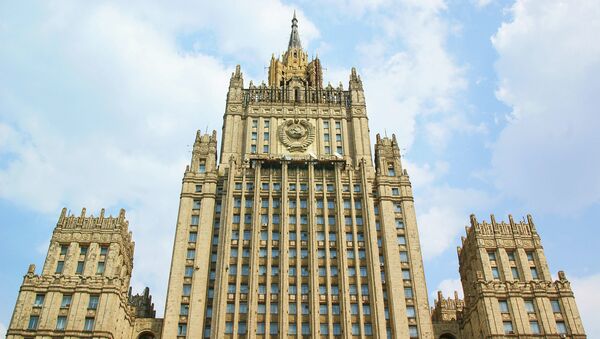MOSCOW, October 23 (RIA Novosti) – A Russian Foreign Ministry spokesman said Wednesday that a meeting of 11 nations on resolving the Syrian conflict resulted in a call for regime change, a challenge that upsets plans for a peace conference in Geneva.
The final document adopted at the London meeting on Tuesday “again sets regime change in Damascus as the key task, defines the National Coalition as the sole legal representative of the Syrian people, and voices a threat to use ‘all options’ to influence the violators of ‘London decisions,’” Alexander Lukashevich said in a statement.
“This is a poorly masked threat to return to the scenario of using military force, which is unacceptable,” said the statement, posted on the ministry’s website.
Foreign ministers of 11 countries comprising the Friends of Syria group met to discuss the preparation for the Geneva-2 conference, designed to get the Syrian government and opposition groups to meet for peace talks.
A Syrian government representative last week told journalists in Moscow that Geneva-2 would start on November 23. However, only the United Nations has the authority to set the date, and major Syrian opposition groups remain reluctant to take part.
Lukashevich’s statement also lamented that “our Western partners are trying in vain to ensure the participation of opposition structures in an international conference under the umbrella of the [Syrian] National Coalition, which has been proposed by Russia and the United States.”
“An impression is created that the ‘London document’ aims to provoke Damascus in order to try to frustrate Geneva-2 while shifting the blame from the opposition to the Syrian authorities,” the statement said.
According to UN statistics, more than 100,000 people have died in the 2 1/2-year civil war in the Middle Eastern country. The number of refugees caused by the conflict hit 2 million in September, the UN said.
International experts began eliminating Syria’s chemical weapons in early October, in accordance with a US-Russian plan to seize and destroy the arsenal. The plan was approved in September 2013 by the Organization for the Prohibition of Chemical Weapons (OPCW) and supported by a UN Security Council resolution.
The plan has so far helped avoid foreign military intervention in Syria. The United States considered a “limited” series of air strikes on Syrian government targets as punishment for a number of chemical attacks that killed civilians. Russia has said there is not definitive evidence as to whether Syria’s ruling regime was responsible for all such chemical attacks.


